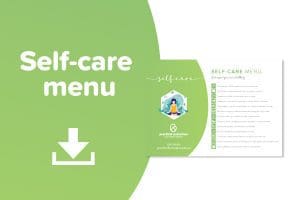This October 10 is World Mental Health Day, as well as Mental Health Month throughout October in Victoria — both timely reminders that taking care of yourself and others should be a priority.
Raising awareness of the mental health issues that affect people all over Australia is the aim of World Mental Health Day and Mental Health Month. This focus on mental wellbeing is now vitally important in light of the events across the globe over the last few years.

Let’s take the opportunity this month to check on our own mental wellbeing as well as that of those around us. We can work together to create meaningful conversations, break stigma and improve access to tools, strategies and resources so that we are all empowered to overcome setbacks to see a brighter tomorrow. Mental health awareness and a focus on wellbeing are vital for a caring and compassionate society.
Mental health struggles can affect anyone
Mental health issues can affect any person, regardless of their circumstances. No matter your age, gender, career, relationship or socioeconomic status, no one is immune to mental health struggles. BeyondBlue highlights that there are various points in our lives that make us more vulnerable to mental health challenges, such as when we are experiencing big changes in life. With one in four young people experiencing a mental health condition, and depression among the most disabling conditions later in life, it’s important to note that mental wellbeing can be affected at any age.
According to Health Direct, symptoms of mental health issues can range from behavioural to emotional to physical, including:
- Feeling anxious
- Feeling sad
- Feeling worthless
- Sleep problems
- Weight or appetite changes
- Changes in behaviour
- Substance abuse
As well as being aware of how mental health troubles can present in ourselves and others, it’s essential to know what to do next. There are also many strategies to manage mental health and enhance your wellbeing.
Learning self-care strategies for mental wellbeing
Speaking with a health professional is a great thing to do if you feel that your mental health is not in a good place. On top of seeking professional support, self-care can be good place to start looking after yourself better and improving your mental wellbeing. Self-care is so much more than just a relaxing bubble bath, and the benefits are far-reaching and include reduced stress levels, increased levels of resilience and improved overall health.
Do the things you enjoy
Try to do one thing as a minimum each day just for pleasure. It might be reading a book with a hot chocolate in hand, listening to music or watching your favourite show. You deserve it.
Exercise regularly
Research indicates that exercise is a highly effective way of managing mental health and its symptoms. Exercise releases endorphins which help to make us feel happy, so fit in any exercise you can manage each day, even if it’s just a short walk to get started.
Meditation and mindfulness
Life can be overwhelming, but meditation and mindfulness techniques can help create some space and give you an escape. Mindfulness is valuable for children’s wellbeing, as well as adults.
Tune out from the news
The news has been a rollercoaster this year, to say the least. It’s okay to switch it off and forget about the state of the world for a while. In fact, it’s recommended, particularly if the news is making you sad or anxious.
Support and resources for mental health
There are many apps, online tools, phone lines, web and text chat services and more to support you when you need it most. You should also feel comfortable and confident about speaking to your doctor — they can help you with a mental health plan that will give you greater access to professional support to manage your wellbeing.
Keep these resources in mind for yourself, or to share with others:
- Lifeline Australia – Provide access to 24 hour crisis support and suicide prevention services.
Website: www.lifeline.org.au Telephone: 13 11 14
- Beyond Blue – Provides information, and support for depression, anxiety and suicide prevention.
Website: www.beyondblue.org.au Telephone: 1300 224 636
- Headspace – Provides young people with information and resources on mental health, physical health, work and study support, and alcohol and other drug services.
Website: www.headspace.org.au Telephone: 1800 650 890
- 1800 Respect – Provides 24 hour support to people impacted by sexual assault, domestic or family violence and abuse.
Website: www.1800respect.org.au Telephone: 1800 737 732
- Mindspot – Provides free effective internet delivered psychological assessment and treatment for stress, anxiety, worry, depression, low mood, OCD and trauma (PTSD).
Website: www.mindspot.org.au Telephone: 1800 614 434
- Kids Helpline – Provides private and confidential 24/7 phone and online counselling service for young people aged 5 to 25.
Website: www.kidshelpline.com.au Telephone: 1800 55 1800
- National Debt Helpline – Helps people tackle their debt problems.
Website: www.ndh.org.au Telephone: 1800 007 007
- National Coronavirus Helpline – Provides information and advice about COVID-19.
Telephone: 1800 020 080
Care and compassion for better mental wellbeing
Care and compassion are at the heart of everything we do at Practical Outcomes. To be in the best position to provide support and care to those around us, we need to prioritise our own mental wellbeing too.
Download our self-care checklist below to help keep on top of your mental wellbeing and ensure you are doing everything possible to look after yourself. If others around you might need a reminder to take care of their mental wellbeing, go ahead and share it with them too.
Reaching out to others is one of the most valuable things we can do, and we encourage everyone to use World Mental Health Day and Mental Health Month to make reaching out a habit.
Download our self-care checklist

Practical Outcomes is dedicated to supporting our learners and early childhood education clients. For more information, contact us today.



